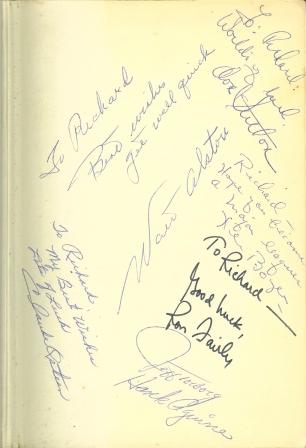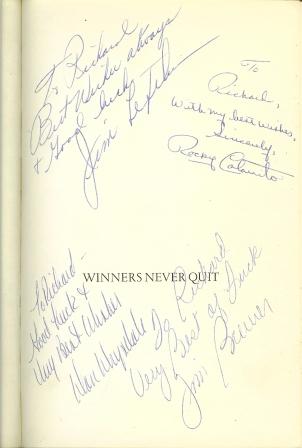
| Baseball Beat | June 28, 2006 |
1968. It was a down year for the Dodgers. And for me. I turned 13 that July. Oh, becoming a teenager wasn't so bad. But coming down with Osgood-Schlatter disease and pneumonia at the same time just about ruined my summer.
If you're going to suffer both illnesses, I guess it makes sense to come down with them concurrently. No need to be on the disabled list any longer than necessary. I think my Mom and Dad put me on the 60-day DL in early June. It was the first time in my "career" that I had ever missed any action.
After playing four years of Little League, I was enjoying my first season of Pony League when I was diagnosed with my diseases. I played the first half of what I believe was a 20-game schedule but missed the entire second half with my knee pain and pneumonia.
I couldn't play baseball. I couldn't ride my bike. I couldn't even run. Well, now that I think about it, I really never could run all that well anyway. To wit, my high school coach used to time me running from home to first with a calendar. I can hear him now, "January, February, March, April..." I wasn't all that bad. I mean, I don't think I ever made it into May. Mickey Mantle could run to first base in 3.1 seconds. I could run to first base in 3.1 months. But the Mick could only do that hitting from the left side. I had the disadvantage of being a right-handed hitter.
In any event, I was sidelined that summer. I was instructed by my doctor to rest and apply ice to my knees frequently. I don't think the ice bags helped my pneumonia much, but my lungs seem to clear up at about the same pace as the improvement in my knees. I was a prime candidate for Osgood-Schlatter as it generally afflicts children in a "growth spurt" between 10 and 15 years old who are involved in sports. I was always tall for my age, but I shot up several inches that year. The good news is that I lost all my baby fat and was as slim as I had ever been.
What's a 13-year-old boy, who has no clue about girls, to do in his summer between seventh and eighth grades when he can't play his favorite sport and is mostly confined to home? Well, he listens to all of the Dodger games on the radio, plays lots of APBA, and reads a bunch of sports books.
My Dad gave me Winners Never Quit by Phil Pepe. The title was short for the slogan, "Quitters Never Win; Winners Never Quit." It could be found scribbled on blackboards in locker rooms across the country. Pepe's book was inspiring, given to me by Dad to cheer me up during a period when I was down and out.
The book chronicled 15 star athletes who overcame injuries and obstacles with courage, guts, and desire. Each chapter had a subtitle that was an actual quote from another player or coach.


What made the gift extra special were the autographs that adorned the first two pages of the book. My Dad, who covered the Dodgers as the beat writer for the Long Beach Independent, Press-Telegram from 1958-1968, had asked manager Walt Alston and ten players (including several of the best known) to sign the book for me. Alston, Don Sutton, Ken Boyer, Ron Fairly, Claude Osteen, Jim Lefebvre, Rocky Colavito, Jim Brewer, and Don Drysdale personalized their signatures by adding "To Richard" and either "Good Luck," "Best of Luck," or "Best Wishes." Alston even added, "Get well quick." Boyer wrote, "Hope you become a major leaguer."
Although the Dodgers didn't fare all that well that season, Drysdale broke Walter Johnson's consecutive scoreless innings mark of 56. The Big D's streak was almost snapped during his fifth shutout when he hit Giants' catcher Dick Dietz with a pitch with the bases loaded in the ninth inning. But as Vin Scully told those of us listening to the game, "It hit the bat said Wendlestedt. It hit the bat." In actuality, the home plate umpire ruled that Dietz had not made an attempt to get out of the way and called the pitch a ball rather than awarding the batter first base. Drysdale retired Dietz, Ty Cline, and Jack Hiatt to end the game and preserve his streak.
The Hall of Famer epitomized what the book was all about. He never quit. With the help of Wendlestedt, he persevered and went on to record 58 consecutive scoreless innings. Although Drysdale wasn't one of the subjects in Winners Never Quit, the book featured a couple of my favorite players from that era. In junior high school, I wore number 22 and could twitch my head at the free throw line better than anybody not named Elgin Baylor. Being a righty, I couldn't imitate Sandy Koufax nearly as well but, suffice it to say, I knew everything about him--from his birthday to his stats to his mannerisms on the mound.
I read the book from cover to cover. At least twice. I bought into all the messages conveyed from one chapter to the next as well as the Introduction.
Call it courage. Call it guts. Call it desire. There are many names for it, but what is it, really, this indefinable quality that makes a man put out that extra something just when it seems there is nothing left to give?It takes courage merely to try out for the team. It means willingness to suffer, to sacrifice, to work harder than the next fellow. It means you ran that extra lap, practiced the jump shot a half hour longer, ran the dive play a few more times. It means you got home a little later, a little wearier, a little hungrier and with a few more aches and pains. Maybe you thought it wasn't worth it. Maybe you considered skipping practice tomorrow or quitting the team altogether. But you didn't. That is courage.
Missing ten baseball games that summer turned out to be a small price to pay in the big picture of life. You see, the games come and go. But the values we learn stay with us forever. Just like that book, tucked away neatly on a shelf in my home office.
Comments
Good story, Rich.
Posted by: Rob McMillin at June 28, 2006 8:43 AM
Great story Rich. I was 12 that year and got to see that Drysdale game from field level seats. The Giants went ape when Dietz was not awarded the base. Still the best game I've ever seen.
Posted by: Marty at June 28, 2006 8:50 AM
Thanks, Rob and Marty.
Posted by: Rich Lederer at June 28, 2006 4:18 PM
What's happened to penmanship since those days?
Posted by: charles at June 29, 2006 10:59 AM
Rich, my Dad gave me that same book some 20 years later when I was a kid, and it's meant a lot to me, too. It's in pretty ratty shape now but I'll never get rid of it. I live in D.C. and I think of the Ken Venturi chapter every time somebody mentions Congressional Country Club.
Posted by: Tom at July 2, 2006 10:52 AM